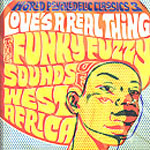|
|
 |
Dusted Reviews
Artist: V/A Album: Love's a Real Thing: The Funky Fuzzy Sounds of West Africa Label: Luaka Bop Review date: May. 26, 2005 |

|
|
|
 |
As tenuous a connection it may be to argue all the cuts on Love's a Real Thing are African versions of the 13th Floor Elevators, this compilation presents West African music from the '60s and '70s with a very left-field vibe. The attitude is not so much flying lollipops as it is freedom; not sexual liberation or freedom from oppression, but a broadening of the sonic horizons, allowing tempos to shift (and, in many cases, slow down and get mellow), new instrumentation to creep in, and arrangements to spread out.
Several tracks distinguish themselves as early examples of the now classic West African tradition of pan globalism, including the superior Orchestre Polyrythmo de Cotonou Dahomey's tribute to their homeland "Minsato Le, Mi Dayihome" (since renamed Benin), and the Cuban son stylings of No. 1 de No. 1 in "Guajira Van" (interestingly, there is more in common here with son than anything associated with guajira).
The oft-present Farfisa and other garage organ sounds do more than anything else to create a psychedelic veneer, but the real explorations involve musical ideas as opposed to the short-lived fashionable textures of late-'60s' British and American psychedelic pop and rock. Manu Dibango's "Ceddo End Title," the title itself evocative of soundtrack music, brings in equal parts of ratchety blaxploitation guitar wah and proggy bass. Others reach out to both post-bop jazz and deep American soul. Check Moussa Doumbia's "Keleya," in which 30 seconds of vamping by drum, bass and sax reveals clever (if not accidental) nods to "Inner City Blues" and "Surrey (With The Fringe On Top)."
Perhaps the most noteworthy phenomenon is the blending of African religions with decidedly Western soul and rock aesthetics. Ofo The Black Company's contribution, "Allah Wakbarr" features extended rounds of fuzzy, ecstatic guitar soloing that checks in like overheated blues, half-possessed by the cosmic meandering of Eddie Hazel and the angular middle-finger freakouts of Greg Ginn's work with mid-period Black Flag. This juxtaposition of Islam and chaotic rock and roll may be almost unheard of in the post-9/11 world. An even more successful combination, and arguably more uniquely African in content and aesthetic, is Tunji Oyelana & The Benders' "Ifa," a blistering jeep homage to the Yoruba religion Ifa, the ancient antecedent to Santeria and Candomble. The shuffling rhythm, with long passages of drum and sax chatter that could easily pass for a Clyde Stubblefield/Maceo Parker workout, pushes along as the dual vocal tracks invoke the prayers and salutations of Ifa. They pay tribute to Eiji Ogbe, the first of the religion's 256 odu (parables), as well as the religion itself and the revered eggun (dead ancestors) of the singer. In Oyelana's voice, the Yoruba language takes on a different feel than the relaxed, partytime croon of juju singers like King Sunny Ade and Ebenezer Obey; notes and words strain to be heard above the funky rumble of the music, resulting in an exuberant passion that wouldn't be alien to gospel.
Beneath the droning organs and fuzzed out guitars gracing some of the tunes on Love's a Real Thing, there is a deeper sense of pyschedelia, indicative of a time when boundaries were pushed far beyond the standard high-life and rumba that pre-dated global acceptance. One can only hope that West African music will see another resurgence of such bold experimentation: looking back at the effect the Brazillian classics series had on the rest of the world, Luaka Bop may be poised to trigger another quantum leap of recognition for global funk.
By Andy Freivogel
|







